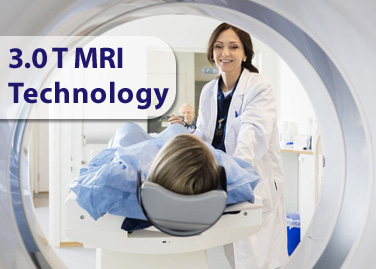Procedure
Prepare for MRI

1 of 3
3.0T MRI Technology
MRI scans have guided diagnoses and saved lives for nearly 45 years. Even those of us who haven’t had an MRI scan know the procedure from movies and television: the patient slides dramatically into a brightly lit, loudly banging tube, and moments later their medical team has a detailed view of their precise medical condition, surpassing what they were able to achieve with X-rays or CT scans.
In real life, traditional MRIs aren’t quite that straightforward. Scanning a single body part can take an hour or more. MRI results are seldom crystal clear, though they represent major advances from older technologies like CT scans and X-rays, and often require some degree of interpretation. Some conditions cannot be accurately documented via MRI. And the entire experience is even more claustrophobic than medical dramas tend to suggest.
That’s why Diversity MRI is so proud to offer the most powerful MRI scanner available for clinical use. Our 3.0 T MRI scanner delivers twice the power of traditional machines while providing clearer results addressing a wider variety of conditions, all while affording patients briefer, more comfortable sessions.
Our scanner delivers a full three Ts of imaging power.
Traditional MRI machines are limited to 1.5 T. The extra power means that 3.0 T systems produce better signal-to-noise ratios and spatial and temporal resolution than traditional MRIs. Because of this, 3.0 T scanners are taking MRI scanning into entirely new territory.
On a practical level, 3.0 T systems make MRI scanning available to a wider variety of patients. The power of our MRI machine and our analytical software all but eliminate the need for gadolinium as a contrast agent for vascular imaging. This is great news for patients with kidney issues, who have traditionally been prevented from receiving MRIs because of the risks inherent in gadolinium injections.
Our scanner can also document a wider variety of organs and structures than traditional MRI scanners, which allows physicians to assess more conditions than ever before. This is especially important when scanning for abnormalities in vascular flow—a reliable way to screen for cancers of the prostate and other organs. Its superior resolution also extends the value of MRI to assessments of minute structures including the inner ear and the biliary system.

2 of 3
Hospital Gown
You will need to change into a hospital gown. This is to prevent artifacts appearing on the final images and to comply with safety regulations related to the strong magnetic field.
Guidelines about eating and drinking before an MRI vary between specific exams and facilities. Take food and medications as usual unless your doctor tells you otherwise.

3 of 3
Allergies
Some MRI exams use an injection of contrast material. The doctor may ask if you have asthma or allergies to contrast material, drugs, food, or the environment. MRI exams commonly use a contrast material called gadolinium. Doctors can use gadolinium in patients who are allergic to iodine contrast. A patient is much less likely to be allergic to gadolinium than to iodine contrast. However, even if the patient has a known allergy to gadolinium, it may be possible to use it after appropriate pre-medication.
Tell the technologist or radiologist if you have any serious health problems or recent surgeries. Some conditions, such as severe kidney disease, may mean that you cannot safely receive gadolinium. You may need a blood test to confirm your kidneys are functioning normally.
About clinic
Why patients choose
our center
It’s the way we treat our patients and referring physicians that really sets us apart. From the warm greeting extended by our front desk staff to the detail and attention given by our technical staff, to the dedication and concern offered by our radiologists, each patient is treated with the utmost care.
Clinic skills
Our specialisations
87%
Cardiac MRI
93%
Head MRI
96%
Lumbar MRI

Our professional and friendly staff strives to provide each patient with personalized service and attention. We understand that there are other choices. Excellent patient care and satisfaction is our goal.
Get Scanned In As Little As
18 Minutes
Diversity MRI is proud to announce that our awesome Phillips 3T scanner is capable of complete MRI scans in as little as 18 minutes. Call us at 954-905-7217 to get screened for your MRI today!












